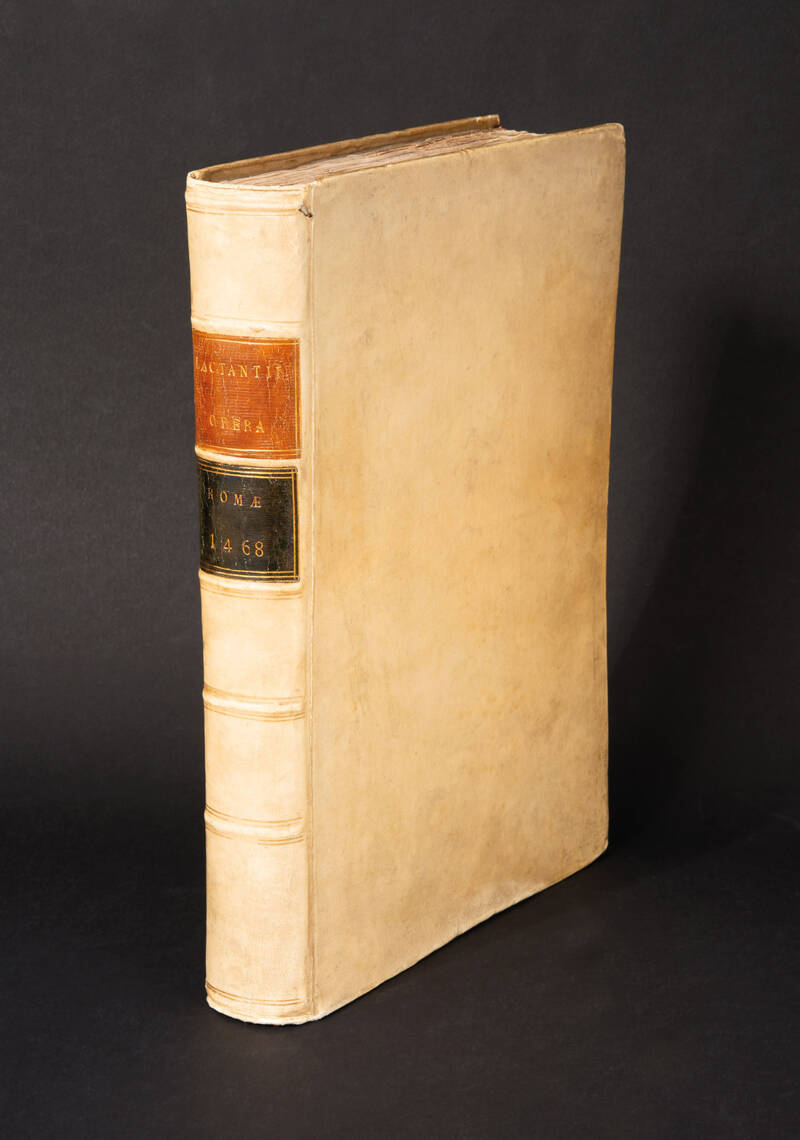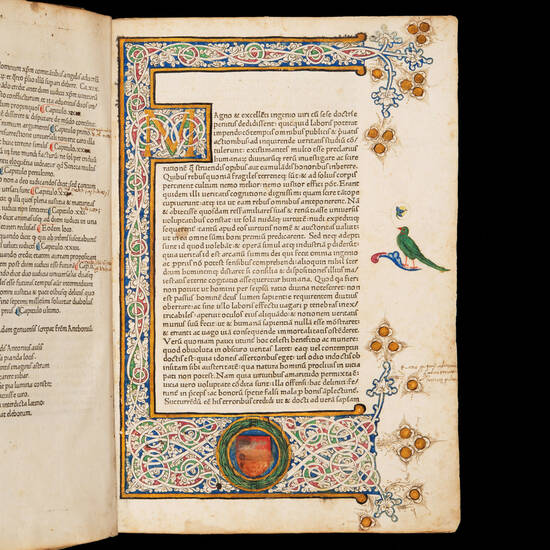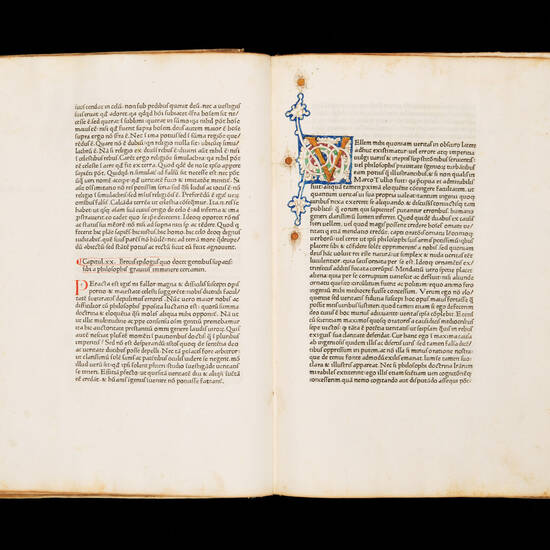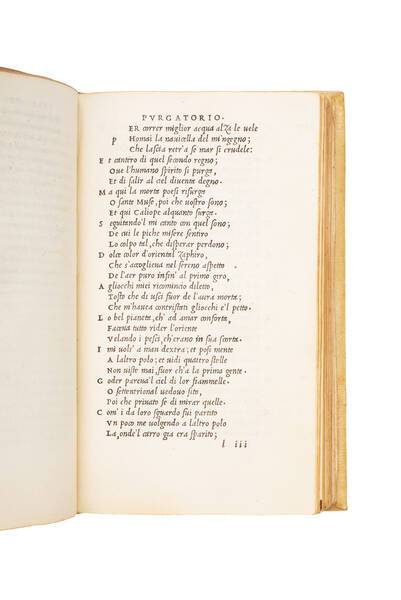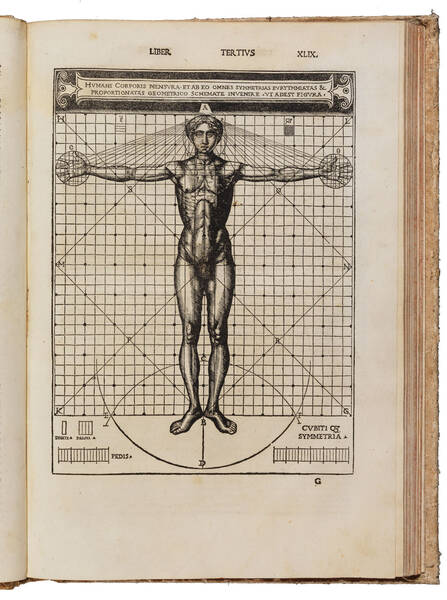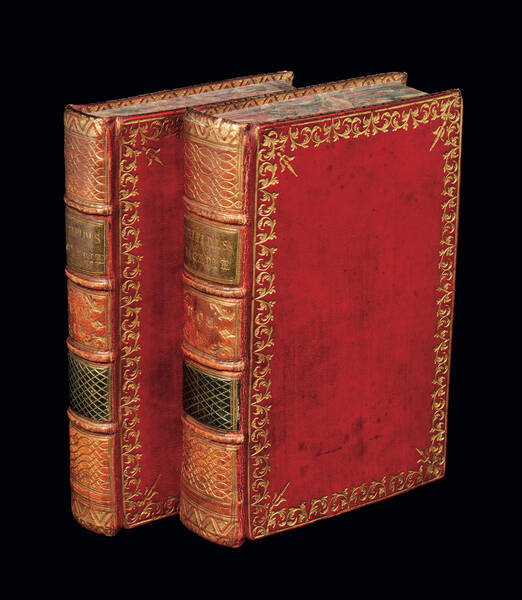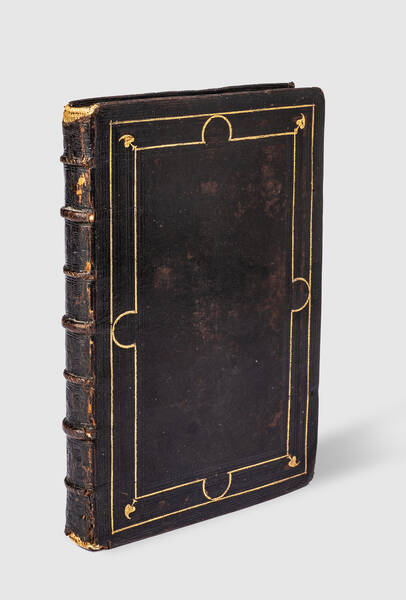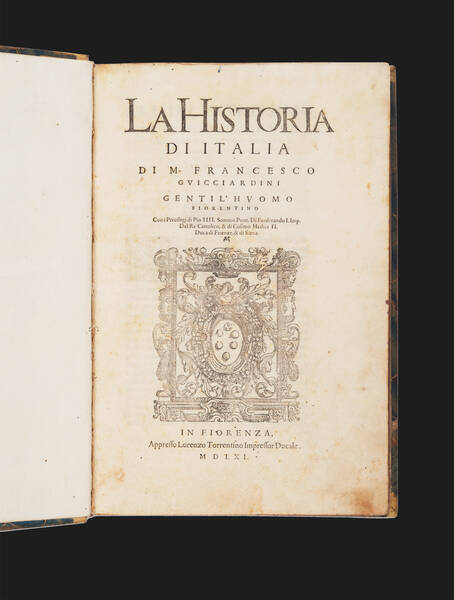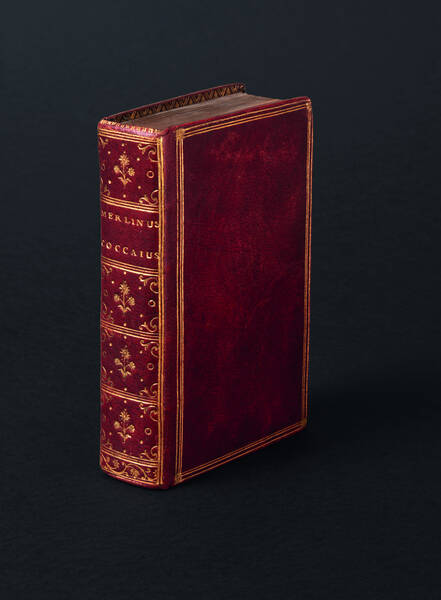LACTANTIUS, Lucius Coelius Firmianus. Opera.
Rome, Conradus Sweynheim and Arnoldus Pannartz., 1468.Folio (342 x 230mm.), 218 leaves (of 220, without initial and final blank leaves). Collation: [*12, 1-1110 128 13-1610 1712 18-2010 218], 38 lines, roman type (115R) with printed Greek quotations. On 2/1r (f. 13r) a six-line initial “M” is supplied in gold on a background of white-vine decoration defined in crimson, blue and green which extends into the margins to form three borders edged in gold; the white-vine decoration in the lower margin of the same page incorporates a green laurel wreath within which is a defaced coat of arms, eight similar initials supplied in gold on white-vine grounds at the beginning of each book, one smaller initial in last quire, smaller initials supplied in alternate red and blue; paragraph marks supplied in alternate red and blue at the beginning of each chapter. A few spots and marginal foxing, light worming at the end, marginal notes by at least two different hands, a couple of ancient restorations in the white margins, overall a very good copy from the library of Augustus Frederick, Duke of Sussex (1773-1843) with his ex-libris; “I purchased this volume August 14th 1854 ate the sale rooms of Sotheby. It was one of the late Pickering Stock. It had fromerly graced the Library of the late Duke of Sussex” (pencil note on the rear endleaf). XVIII century stiff vellum, spine in compartments with two morocco lettering pieces.
Second edition of Lactantius - the first was printed in Subiaco three years earlier by the same Sweynheim and Pannartz – first appearence in print of De Phoenice Carmen taken from Ovid's Metamorphoses, and the first appearence in print of any part of Dante's Commedia, two terzine about the phoenix (Inferno, XXIV, 106-111) are printed in the last quire. Moreover this is the second or the third book printed in Rome. A very important and rare book.The book contains Lactantius De divinis institutionibus, De ira dei, De opificio dei vel de formatione hominis, De phoenice carmen; Antonius Raudensis: Errata Lactantii; Adam Genuensis's Verse censuring Antonius Raudensi; .Ovidius Naso, Publius: Metamorphoses, (15. 391-402); Dante Alighieri: La Commedia, (Inferno, XXIV, 106-111); Venantius Fortunatus De Christi resurrectione.”Lucius Caecilius Firmianus Lactantius (born AD 240, North Africa—died c. 320, Augusta Treverorum [now Trier, Ger.]), was a Christian apologist and one of the most reprinted of the Latin Church Fathers, whose Divinae Institutiones, a classically styled philosophical refutation of early-4th-century anti-Christian tracts, was the first systematic Latin account of the Christian attitude toward life. Lactantius was referred to as the ‘Christian Cicero' by Renaissance humanists. Lactantius was appointed a teacher of rhetoric at Nicomedia (later İzmit, Tur.) by the Roman emperor Diocletian. When the emperor began persecuting Christians, however, Lactantius resigned his post about 305 and returned to the West. Later, in about 317, he came out of retirement to tutor the emperor Constantine's son Crispus, at Trier. Only Lactantius' writings dealing with Christianity have survived.” (Encyclopedia Britannica) “His surviving works and the testimonies of his successors demonstrate that he was a poor theologian, being ...more adept at showing the incongruity of heathen polytheism than in establishing Christian teaching." (The Oxford Dictionary of the Christian Church) Saint Jeromewrote of him that: "If only Lactantius, almost a river of Ciceronian eloquence, had been able to uphold our cause with the same facility with which he overturns that of our adversaries!" The stated purpose of Lactantius' writings was to present Christianity in a form that would be attractive to philosophical pagans. In practice this resulted in a uneasy amalgam of Christianity, Platonism, Stoicism and Pythagorianism. His views led to his posthumous condemnation as a heretic. Interest in his works was revived during the Renaissance not because of their outstanding theological content, but rather due to their "excellent Latin style." The surviving works of Lactantius have played an important part in the development of what J.B. Russell calls "the flat error" - the idea that the early and mediaeval church taught that the earth is flat. (Jeffrey Burton Russell, Inventing the Flat Earth: Columbus and Modern Historians. New York: Praeger, 1991, 32).The reason for this was because he linked the a rejection of belief in antipodes (the existence of a country on the other side of the world) with the shape of the earth. The question of the existence of the antipodes had posed a problem for all Christian theologians. Russell, who has researched the "flat error" in some detail, explains: Christian doctrine affirmed that all humans must be of one origin, descended from Adam and Eve and redeemable by Christ, "the Second Adam." The Bible was silent as to whether antipodeans existed, but natural philosophy had demonstrated that if they did, they could have no connection with the known part of the globe, either because the sea was too wide to sail across or because the equatorial zones were too hot to sail through. There could be no genetic connection between the antipodeans and us. Therefore any alleged antipodeans could not be descended from Adam and therefore could not exist.” (Rob Bradshaw, Lactantius (c. 250 - c. 325), on “EarlyChurch”)
This is among the first three books printed in Rome. After having left Mainz where they have learned the printing process with the mechanical movable-type printing press invented by Gutenberg, Conrad Sweynheym and Arnold Pannartz, clerics from the archidioceses of Mainz and Cologne respectively, established in 1464 a press at the Benedictine Santa Scolastica monastery at Subiaco. In Subiaco they issued only four editions: a grammar by Donatus, no copy of which survives; Cicero's De oratore; the editio princeps of the works of Lactantius, dated 29 October 1465; and the first edition of the works of St. Augustine, dated 12 June 1467. In the same year,
Sweynheym and Pannartz moved their printing shop to Rome at the Palazzo Massimo, most likely at the behest of Cardinal Bessarion, the great humanist. Bessarion's secretary, Giovanni Andrea Bussi, soon became chief editor of the press (and later papal librarian), directing its printing program of humanistic texts. In 1467, Conrad Sweynheym and Arnold Pannartz also printed their fist book in Rome, Cicero's Epistolae ad familiares, followed, in 1468, by Lactantius' works.
IGI 5620; BMC IV 4; Goff L2; HC 9807*
Other Books
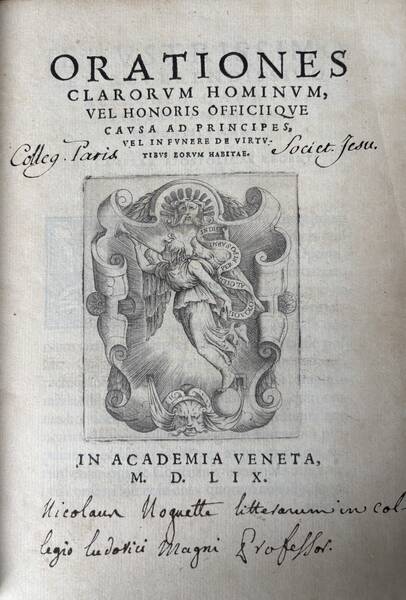
ACCADEMIA VENETA
Orationes clarorum hominum, vel honoris officiique causa ad principes, vel in funere de virtutibus eorum habitae.
€ 1.500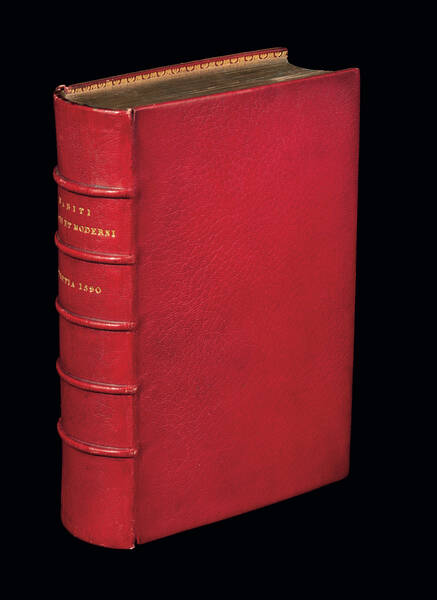
VECELLIO, Cesare
Degli Habiti Antichi, et Moderni di Diverse Parti del Mondo Libri due, fatti da Cesare Vecellio, & con Discorsi da Lui Dichiarati.
SOLD OUT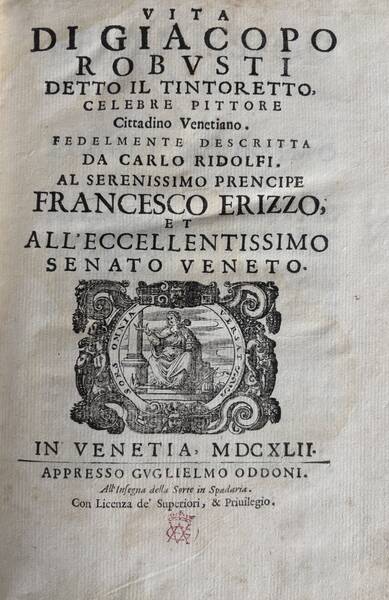
RIDOLFI, Carlo
Vita di Giacopo Robusti detto il Tintoretto, celebre pittore, cittadino venetiano.
€ 2.500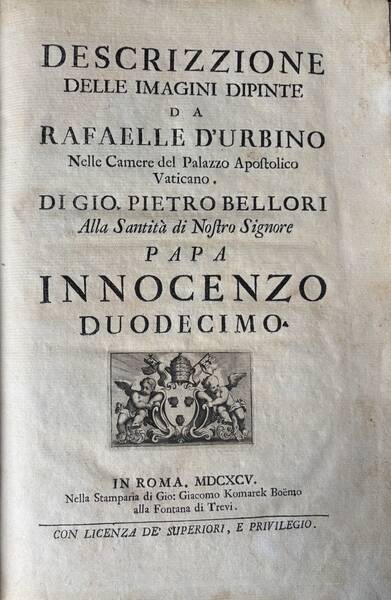
BELLORI, Giovanni Pietro
Descrizzione delle immagini dipinte da Rafaelle d'Urbino nelle camere del palazzo Apostolico Vaticano.
€ 2.500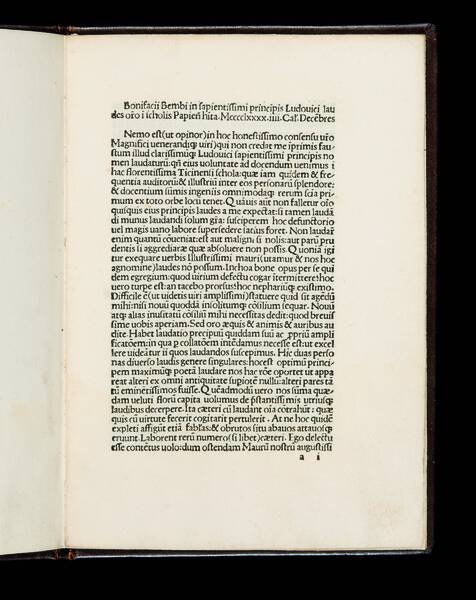
BEMBO, Bonifacio
In sapientissimi principis Ludovici laudes or(ati)o i(n) scholis Papien(sibus) h(ab)ita.
SOLD OUT![Tragoediae septem cum commentariis. [Greek] Edited by Johannes Gregoropoulos Cretensis]. Tragoediae septem cum commentariis. [Greek] Edited by Johannes Gregoropoulos Cretensis].](https://www.medariquier.com/typo3temp/pics/a7f4ddada3.jpeg)
SOPHOCLES
Tragoediae septem cum commentariis. [Greek] Edited by Johannes Gregoropoulos Cretensis].
SOLD OUT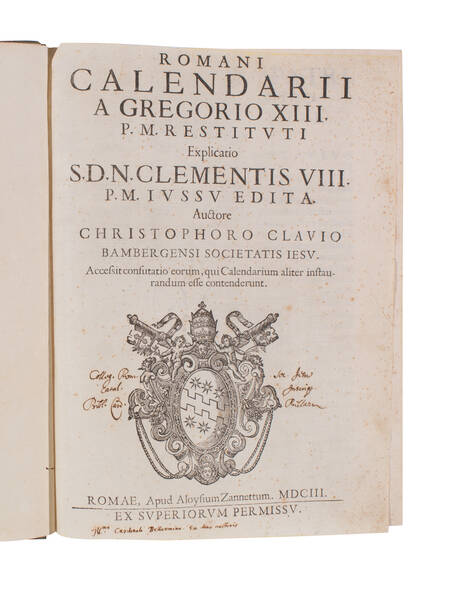
CLAVIUS, Christoph
Romani calendarii a Gregorio XIII. P.M. restituti Explicatio S.D.N. Clementis VIII. P.M. iussu edita.
SOLD OUT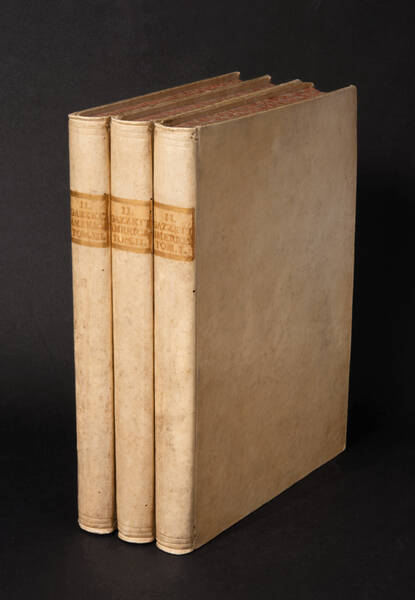
GAZZETTIERE AMERICANO
Il Gazzettiere Americano, contenente un distinto Ragguaglio di Tutte le Parti del Nuovo Mondo.
SOLD OUT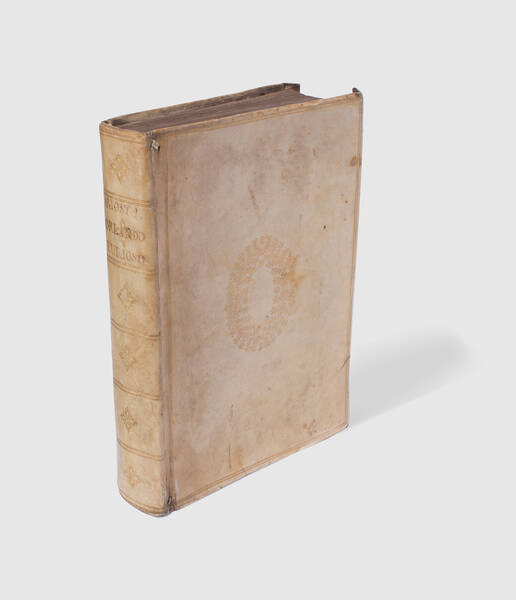
ARIOSTO, Ludovico
Orlando furioso di m. Lodouico Ariosto nuouamente adornato di figure di rame da Girolamo Porro padouano et di altre cose che saranno notate nella...
SOLD OUT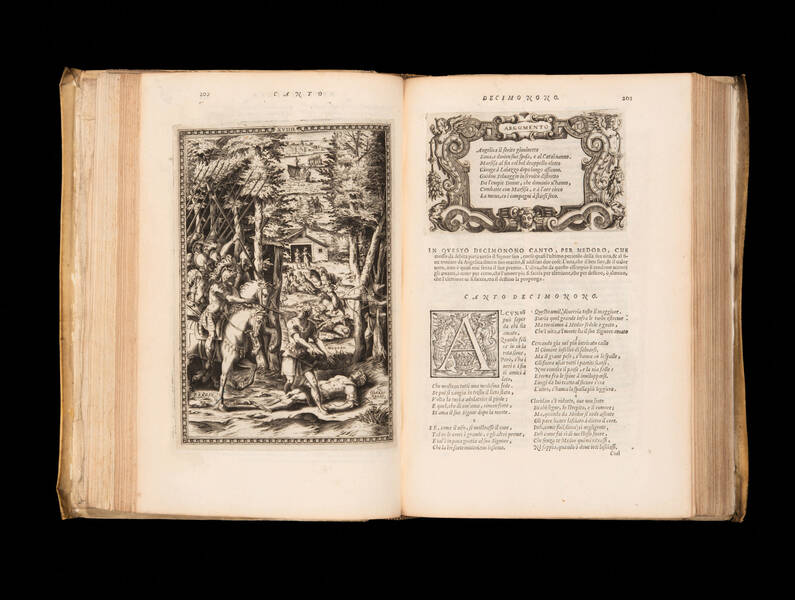
ARIOSTO, Ludovico
Orlando furioso di m. Lodouico Ariosto nuouamente adornato di figure di rame da Girolamo Porro padouano et di altre cose che saranno notate nella...
SOLD OUT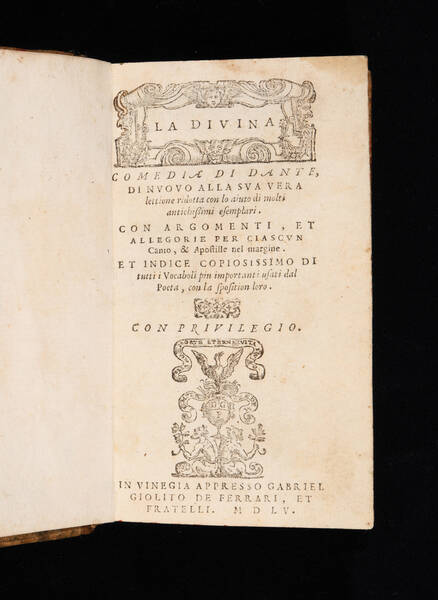
ALIGHIERI, Dante
La Diuina Comedia di Dante, di nuouo alla sua vera lettione ridotta con lo aiuto di molti antichissimi esemplari. Con argomenti, et allegorie per...
SOLD OUT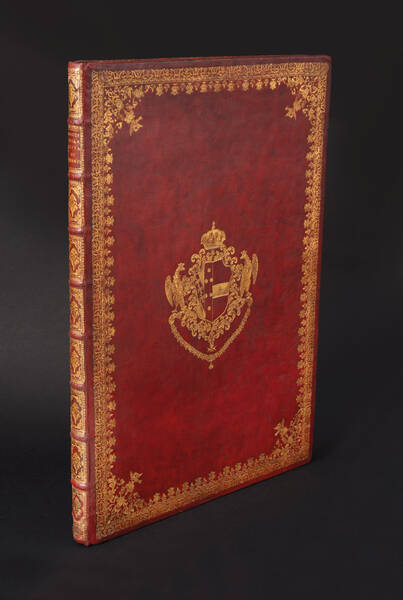
ZOCCHI, Giuseppe
Scelta di XXIV vedute delle principali contrade, piazze, chiese, e palazzi della citta di Firenze.
€ 45.000MEDA RIQUIER rare books ltd.
4 Bury Street St James's
SW1Y 6AB London
Phone +44 (0) 7770457377
info@medariquier.com
